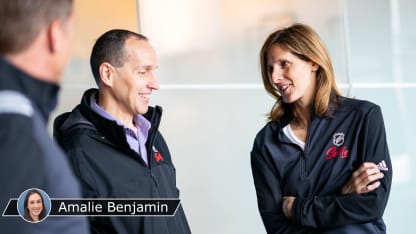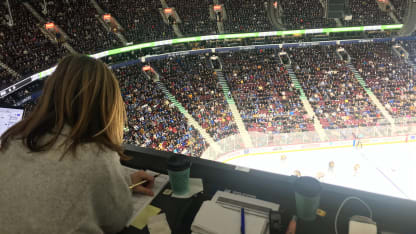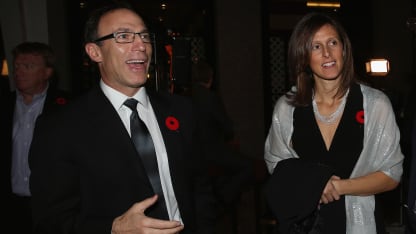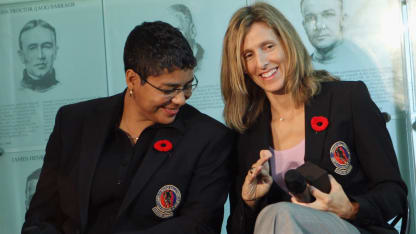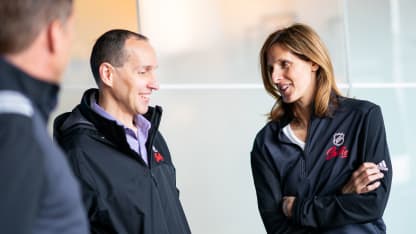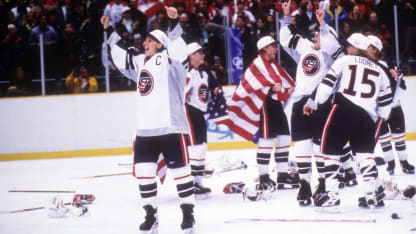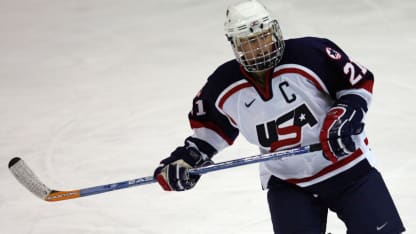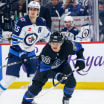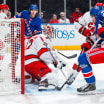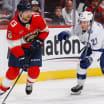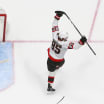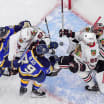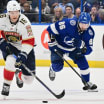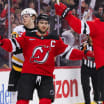It feels right, really, after all the time she has spent talking hockey to her brothers and her husband, all that time informally evaluating players, trying to figure them out, to make assessments. Then, there was nothing on the line.
Now, it's different.
That's part of the learning curve for Granato, as she eases into her job as a professional scout based in Vancouver, watching the NHL's Western Conference teams and helping Seattle create a system and a knowledge of the League that it will use as it attempts to build a team from scratch.
"It's a natural progression," Granato said. "You're writing down comments that you've thought before, but now they actually matter. It's a pretty natural transition. Don't get me wrong: I have a lot to learn and I have a lot to see and I have a lot of data to take in, but just the fit of it is very natural."
That's why Seattle general manager Ron Francis wanted her as part of his team. He looked at the franchise he was building, one where they're attempting to do things just a little bit differently, perhaps as much in the mold of a tech company as an NHL team. He knew that if he wanted diversity of opinion, diversity of voices, here was a person perfectly positioned to offer exactly that.
"With all due respect to all my other hires on the pro scouting staff," Francis said, "she might have the most qualifications with the gold medal and the Hockey Hall of Fame resume."
* * * *
Long before Granato arrives at Rogers Arena, she has already done much of the work necessary to make this evening a success. After filing her most recent report -- from a game two days before against the Calgary Flames -- Granato prepped by watching a little video of the Predators. This is the second time they have come through Vancouver, and so Granato has already gotten a chance to see them this season.
She has picked out half a dozen players to focus on, as she does for every game, writing their names on a yellow post-it note that she will tuck under her notebook. She realized early the impossibility of focusing on everyone, given her need to watch them off the puck, and has since narrowed her gaze to a specific few, looking for quality over quantity.
"The first game I went to, I showed up and I thought I had to write out everybody, right?" she says. "It was more education. So [now], one of the things I like is knowing who I'm going to look at and then if someone else jumps out, fine."
She scribbles something in that tiny writing.
"It gets easier as you watch," she says. "You can pick out the other players too. I think by honing in on the right players, it doesn't feel as chaotic in your head about, who do I watch? And then you might notice somebody else, a player on the other line or a defenseman or something. You can write a couple sentences, you can write a paragraph. It's all on your preference."
It's 7:06 into the first period and Zack MacEwen opens the scoring for the Canucks. There are ebbs and flows in the game and, Granato notes, some of the players are less sluggish than they were two nights ago, in a 6-2 loss to the Flames, when the Canucks were in their first game back home after a five-game road trip.
She seems confident, her eyes constantly on the ice, before swiveling up to a mounted television to watch a replay. It's a far cry from that first game, when she entered the arena with all the trepidation of a first day on the job, Hall of Fame plaque notwithstanding.
It was, she said, overwhelming.
"There was a guy next to me, first shift he starts writing literally 10 seconds into the game," Granato recalled. "They didn't really give me direction on what we're supposed to write, so I'm like, what did he just write down? I didn't see anything there. And you're watching and then you realize like five minutes in, OK, I noticed this or I noticed that, and I started writing it down."
She settled in. It got easier.
* * * *
Granato was just starting to think about what was next when Seattle was awarded an NHL team on Dec. 4, 2018. The city was three hours away from her home in Vancouver, and that made it a possibility. She has two sons, 13 and 10 years old, and since retiring from playing, her primary job has always been at home, especially important given that her husband, former longtime NHL player and current TSN broadcaster Ray Ferraro, is on the road four or five days per week.
